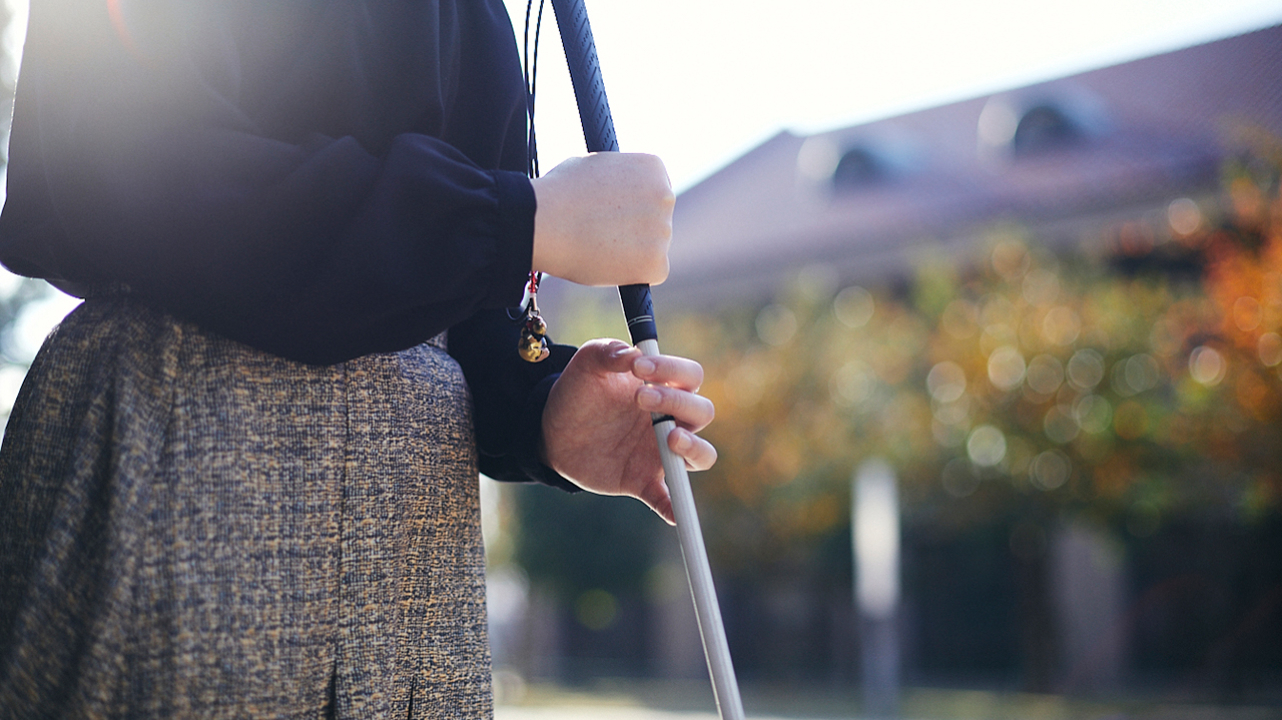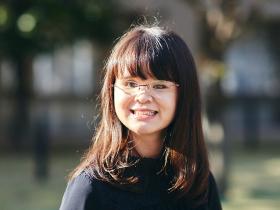Why I Want to Learn - The World I Found after Overcoming Cancer
Kotono Matsuoka has impairment of both eyes and the right knee, and uses a white cane in her daily life. She has had cancer three times. Having studied in Germany for 13 months and participated in teacher training programs, she says, “I’d like to attempt whatever I decide to do, even if other people tell me I shouldn’t.” How has she nurtured this strong determination? She talks about this and the path she’s taken in life so far, step by forceful step.


Kotono Matsuoka
Fourth-year student, Faculty of Psychology, Department of Education and Child Development
Between the age of 20 months and the fifth grade, Kotono Matsuoka was diagnosed with cancer (retinoblastoma and osteosarcoma) three times. As a result of these experiences, she decided she wanted to do work that supports children dealing with difficulties due to illness, disability or other reasons, and enrolled in the university’s Department of Education and Child Development. Her favorite phrases is “Never say never.”
-
Enthralled with Germany
When I’m asked what I’ve studied the most at university, I instantly answer, “German!” In my first year, a basic language course was required, so it all started with the “German 1A” class I took then. To be honest, I had no compelling reason for choosing German—it was just a vague interest. But when I went to the class, I was surprised. There was a lot of tension in the lessons, in a good way. Keeping up with the class each week required all my concentration. After a while I realized that I felt frustrated when the teacher would point out a mistake I made. That frustration turned into energy, and at some point I became enthralled with Germany. I was even studying German on my own with Youtube. My desire to study overseas gradually became stronger, and in February 2018 I went to study in the UK on a one-month program. What surprised me the most was the local students’ eagerness for study. In Japan we have the expression “reading the air” [sensing the mood]. In class, for example, there are times when no one raises their hand, and people who actually wanted to raise their hand decide against it in order to fit in. But the students in Britain were the exact opposite. For better or worse, they expressed their thoughts and feelings in a straightforward way. Personally, this aspect of the culture suited me perfectly. I thought, “Yes—it’s a waste not to go for it!” That experience in the UK combined with my strong interest in German may have been the reason I made up my mind to study in Germany. I spent a year studying at both Meiji Gakuin University and a German language school, and in February 2020 I realized my dream of going to Germany. There were a lot of time-consuming preparations, including visa and insurance procedures, but with help from the people around me I was able to start my new life in Germany.
Immediately after I arrived, the university’s language classes for foreign students were closed because of Covid-19, so it turned out that I took the same classes as local students. Unfortunately, my German language skills weren’t advanced enough yet to speak in the lessons with ease. I went to a local adult education center and studied German while teaching Japanese to Germans who were studying Japanese, and one teacher gave me individual German lessons almost every day. I also did language exchanges with German students, and thoroughly reviewed my German studies. My efforts paid off, to the point that every day I truly felt that I understood German better than I had the day before. When I realized I was able to understand the conversations of the German department faculty members and students, I was thrilled. The 13 months I spent in Germany truly flew by.

Cancer and Me
It may have been the experience of dealing with cancer that enabled me to study so hard to attain the goal of “Germany.”
Cancer was a very familiar presence in my life from as far back as I remember. It started with the onset of a form of pediatric cancer called retinoblastoma in my right eye when I was a year and eight months old. When I was four, cancer was found in my left eye, too. Then in fifth grade I was diagnosed with a type of pediatric cancer called osteosarcoma. In the autumn of first grade I developed retinal detachment and went through two operations. From the time I was very young, there were many occasions when I had no choice but think, “I might die early.” Especially vivid in my memory is the time of my retinal detachment surgery when I was eight. The attending physician allowed only my mother into the examination room for the pre-surgery explanation. Now that I’m older I can understand that he did this out of thoughtfulness, but at the time I was really indignant. I thought, “This is about me, so why doesn’t the doctor explain it to me?” If there was a possibility of losing my eyesight, there were a lot of things I wanted to see while I could. If there were things I wouldn’t be able to do later, I wanted to do them now. Whether a person is healthy or not, a life is a limited time. Because of that experience I came to think, “If I have my heart set on doing something, I want to go for it.”

Unfortunately, I focused completely on my studies
In junior high and high school, I came to feel more and more strongly that I wanted to be a teacher. It started when I was in the hospital in the fifth grade and attended the hospital school—a school for children like me who were undergoing cancer treatment. At the time there were over ten kids from elementary to high school age, all studying in the same room. One of the teachers was very kind and treated every student as affectionately as if they were her own children. Since we were in the extreme situation of being forced to think about death, the teacher’s loving actions and words were always a great comfort.
There was comfort, and there was also sadness. In the hospital school I had a classmate who became a treasured friend. We played music together and took tests together, just us two. We laughed a lot and encouraged each other. I don’t think I would have made it through the difficult treatment if she hadn’t been there. Later, I recovered sooner than she did and left the hospital. But I kept thinking, “Is it OK to have been the only one to get better?” I was haunted by feelings of guilt. I wanted to visit her, but didn’t know if I should. To escape these thoughts, I threw myself into my Braille and school studies, working from morning until night. I was 15. The day came when she and I said goodbye for the last time. “Unfortunately, I focused completely on my studies.” When I look back, I can’t help but express it that way.
In the future I want to do work that supports children dealing with difficulties due to illness, disability or other reasons. It was partly because of the experiences I’ve described that I came to feel strongly about this. I was always telling my high school teachers, “I want to be an elementary school teacher.” Then I was fortunate enough to enroll in the Department of Education and Child Development at Meiji Gakuin University, where students can obtain an elementary school teacher’s license.
When I started at the university, I had a lot of worries. “Will I make friends?” “Will people give me strange looks?” But in the orientation for the Department of Education and Child Development, I had an opportunity to introduce myself and talk about my disability. The effect was amazing. Classmates in the department came up and said things like “Fantastic!” and “That was really impressive!” So I was able to open up and gain confidence more quickly than I’d expected. In the department’s classes, especially the music classes, Professor Hiromichi Mito, who is currently my seminar instructor as well, has kindly recorded the assigned music for me. I’ve also received a lot of help from the people at the Student Support Center. They walk with me to places I need to go, and provide various types of support in relation to my studies. I’m truly grateful.

After all, I want to work with children
Getting back to what happened after I returned from Germany, in June and July 2021 I participated in an elementary school teacher training program, and in October I took part in a special support education training program. For me as a person with disabilities, there are rewards and difficulties in teaching and looking after children. For better and for worse, I gained an understanding of the situation in today’s educational settings. An even more valuable experience was coming into contact with children’s pure feelings. Seeing my appearance, kids would exclaim, “Why are your right eye and your left eye different?” or “You’re a zombie!” So I’d settle the matter by saying, “Yes, I’m a zombie!” and playfully chasing after them. Personally, this is the way I want kids to be. There are situations when children’s speech and conduct should be corrected or guided, but it’s important for children to express their thoughts candidly, and for the grownups around them to accept their words with an open mind. More than realize how high the hurdles to being a teacher are, in these programs I was able to reaffirm my wish to work with children.
I’ll learn today, too
The teachers who introduced me to German; Professor Mito, who guided me in my studies without ever letting me take the easy way out; the friends and faculty members who were always nearby; and my family. I am who I am today thanks to countless people, and I could never thank them enough. Today my wish to do work that supports children hasn’t wavered, but the means for doing that is shifting from being a teacher to being a writer. I want to put my experiences into a book. I want to write a picture book that children will pick up in their hands. Every day I think of more and more things I still want to do.
Battling illness, making friends and saying goodbye, studying overseas and training as a teacher. After all these experiences, what I can say is that I love learning new things. The astonishment I feel when an unknown world opens up before me, and the elation I feel when I step into that world. “Even in the period when I had cancer three times, I was alive. The ‘me’ who stayed alive must have some meaning.” Before I started university, I encouraged myself with these thoughts. But now, after experiencing student life, I’m able to think this way in a positive and natural manner.
To affirm the meaning of my life, I’ll learn today, too.

